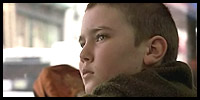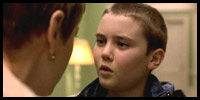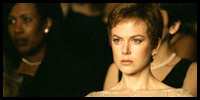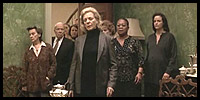
 |
|
Birth (2004) Cast: Nicole Kidman, Cameron Bright, Danny Huston, Anne Heche, Peter Stormare, Lauren Bacall, Alison Elliot, Arliss Howard, Cara Seymour, Ted Levine, Zoe Caldwell, Milo Addica, Novella Nelson, Joe M. Chalmers, Michael Desautels 2004 – 100 minutes Rated: Reviewed by Dustin Putman, October 25, 2004.  In a bracing and welcome turnaround from the norm, "Birth" uses the mystical subject of reincarnation not as an excuse to make a spooky, jump-laden thriller, but as a source in which to realistically explore how a person might react if another believably claimed to be someone they had lost. More unsatisfactorily explored are the details of such a revelation, particularly for the reincarnated party. How, exactly, would he so steadfastly know this? And what brings about his realization, and the deep feelings of love that follow for the one he returns to? If "Birth" fails to answer some of the logical questions that come along with such a loaded topic, and gets bogged down in a conclusion that lacks the courage of its convictions, the film remains fascinating and sincere.
In a bracing and welcome turnaround from the norm, "Birth" uses the mystical subject of reincarnation not as an excuse to make a spooky, jump-laden thriller, but as a source in which to realistically explore how a person might react if another believably claimed to be someone they had lost. More unsatisfactorily explored are the details of such a revelation, particularly for the reincarnated party. How, exactly, would he so steadfastly know this? And what brings about his realization, and the deep feelings of love that follow for the one he returns to? If "Birth" fails to answer some of the logical questions that come along with such a loaded topic, and gets bogged down in a conclusion that lacks the courage of its convictions, the film remains fascinating and sincere.
 It has been ten years since 35-year-old Anna (Nicole Kidman) lost her husband when he suddenly dropped dead while jogging, and is just now proceeding to move on with her life. Newly engaged to Joseph (Danny Huston), Anna is thrown for a loop when Sean (Cameron Bright), a sullen, deep-voiced 10-year-old, tracks her down at her apartment on the Upper East side of Manhattan and claims to be her husband. Anna and her family, including mother Eleanor (Lauren Bacall) and sister Laura (Alison Elliot), are understandably skeptical, but the more time Anna spends with Sean the more she believes he may just be telling the truth. There are things he tells her, indeed, that only her late husband would know, and there is an unmistakable maturity and passion behind his eyes that Anna cannot deny.
It has been ten years since 35-year-old Anna (Nicole Kidman) lost her husband when he suddenly dropped dead while jogging, and is just now proceeding to move on with her life. Newly engaged to Joseph (Danny Huston), Anna is thrown for a loop when Sean (Cameron Bright), a sullen, deep-voiced 10-year-old, tracks her down at her apartment on the Upper East side of Manhattan and claims to be her husband. Anna and her family, including mother Eleanor (Lauren Bacall) and sister Laura (Alison Elliot), are understandably skeptical, but the more time Anna spends with Sean the more she believes he may just be telling the truth. There are things he tells her, indeed, that only her late husband would know, and there is an unmistakable maturity and passion behind his eyes that Anna cannot deny.
 Directed by Jonathan Glazer (2001's "Sexy Beast"), "Birth" is a leisurely, ponderous—but never boring—drama that mindfully avoids the supernatural while sweeping the viewer up in the bizarre predicament Anna finds herself facing. Even-headed reasoning tells her that the young Sean, who shares the name of her husband, isn't really his reincarnation, and, even if he were, the vast age difference must keep them apart. However, in a tasteful, unexploitative manner that dodges creepy pedophilic notions, the offbeat romance that evolves between the adult Anna and 10-year-old Sean is the picture's more beautifully tender flourish. Although the question of whether Sean is telling the truth is always at the forefront of a screenplay by Glazer, Jean-Louis Piel, and Milo Addica, one thing remains certain: he does, without fail and transcending a childhood crush, love Anna. Anna, in return, gradually finds herself entertaining the possibility of Sean's validity, and willing to give up her relationship with fiancé Joseph for the chance to wait out Sean's coming-of-age and rededicate her life to him.
Directed by Jonathan Glazer (2001's "Sexy Beast"), "Birth" is a leisurely, ponderous—but never boring—drama that mindfully avoids the supernatural while sweeping the viewer up in the bizarre predicament Anna finds herself facing. Even-headed reasoning tells her that the young Sean, who shares the name of her husband, isn't really his reincarnation, and, even if he were, the vast age difference must keep them apart. However, in a tasteful, unexploitative manner that dodges creepy pedophilic notions, the offbeat romance that evolves between the adult Anna and 10-year-old Sean is the picture's more beautifully tender flourish. Although the question of whether Sean is telling the truth is always at the forefront of a screenplay by Glazer, Jean-Louis Piel, and Milo Addica, one thing remains certain: he does, without fail and transcending a childhood crush, love Anna. Anna, in return, gradually finds herself entertaining the possibility of Sean's validity, and willing to give up her relationship with fiancé Joseph for the chance to wait out Sean's coming-of-age and rededicate her life to him.
 In as much as a thirtysomething woman and a preadolescent boy can, Nicole Kidman (2004's "The Stepford Wives") and Cameron Bright (2004's "Godsend") make their love story feel plausible, sharing a strong rare chemistry that most motion picture romances strive for and don't quite pull off. Their relationship does not become an overtly sexual one, but director Jonathan Glazer truthfully does not avoid subtle undertones to such; it is, after all, a prominent aspect between two people in love with each other. Giving Anna's actual husband a voice and getting a sense of their marriage before he died, however, is sorely lacking in the puzzle, and could have only clarified the sense of sheer grief Anna has in losing him and confusion in possibly reuniting with him.
In as much as a thirtysomething woman and a preadolescent boy can, Nicole Kidman (2004's "The Stepford Wives") and Cameron Bright (2004's "Godsend") make their love story feel plausible, sharing a strong rare chemistry that most motion picture romances strive for and don't quite pull off. Their relationship does not become an overtly sexual one, but director Jonathan Glazer truthfully does not avoid subtle undertones to such; it is, after all, a prominent aspect between two people in love with each other. Giving Anna's actual husband a voice and getting a sense of their marriage before he died, however, is sorely lacking in the puzzle, and could have only clarified the sense of sheer grief Anna has in losing him and confusion in possibly reuniting with him.
 With a short, closely cropped haircut and a way of being able to say so much without having to speak a word, Kidman is stunning and emotionally available as Anna, filling in the character development and personal feelings not found on the written page. One sequence, filmed in a single silent shot on Anna's face as her mind drifts from an opera she and Joseph are attending, is an acting tour de force. The viewer knows simply by looking at Anna's eyes what she is thinking and going through, and the results are powerful. Bright, meanwhile, delivers a chillingly adult turn as Sean—chilling not because his character is an evil or scary one, but because he is so unselfconsciously adept and natural at portraying the mindframe, speech, and mannerisms of a man three times his age.
With a short, closely cropped haircut and a way of being able to say so much without having to speak a word, Kidman is stunning and emotionally available as Anna, filling in the character development and personal feelings not found on the written page. One sequence, filmed in a single silent shot on Anna's face as her mind drifts from an opera she and Joseph are attending, is an acting tour de force. The viewer knows simply by looking at Anna's eyes what she is thinking and going through, and the results are powerful. Bright, meanwhile, delivers a chillingly adult turn as Sean—chilling not because his character is an evil or scary one, but because he is so unselfconsciously adept and natural at portraying the mindframe, speech, and mannerisms of a man three times his age.
 Evoking Stanley Kubrick (whom Kidman worked with on his last picture, 1999's "Eyes Wide Shut") in its slowly spellbinding pacing and meticulous, always unpredictable technical attributes, "Birth" is a visually sumptuous work. The cinematography by Harris Savides (2003's "Elephant") of a snowy, bitterly cold winter surrounding Central Park is always potent, as are its long, floating, masterful tracking shots, while the lush, piano-heavy music score by Alexandre Desplat (2003's "Girl with a Pearl Earring") defies expectations and betters them. And, in a memorable supporting performance, Anne Heche (2002's "John Q") is startlingly good and aptly mysterious as a woman with veiled ties to Sean.
Evoking Stanley Kubrick (whom Kidman worked with on his last picture, 1999's "Eyes Wide Shut") in its slowly spellbinding pacing and meticulous, always unpredictable technical attributes, "Birth" is a visually sumptuous work. The cinematography by Harris Savides (2003's "Elephant") of a snowy, bitterly cold winter surrounding Central Park is always potent, as are its long, floating, masterful tracking shots, while the lush, piano-heavy music score by Alexandre Desplat (2003's "Girl with a Pearl Earring") defies expectations and betters them. And, in a memorable supporting performance, Anne Heche (2002's "John Q") is startlingly good and aptly mysterious as a woman with veiled ties to Sean.
 The way in which "Birth" wraps up its story threads comes as an unsatisfying, borderline-cowardly epitaph to the thought-provoking material that has come before. In an effort to explain itself and go off in a direction that avoids dealing directly with a romantic relationship between a woman and a child, the movie actually raises more last-minute questions and answers very few of the ones brought up during the rest of the film. There is a refreshing open-ended quality to the final scenes that allow viewers to draw their own conclusions, but director Jonathan Glazer doesn't fully realize the themes he set out to examine. Problematic third-act turns considered, the preceding 75 minutes of "Birth" are thought-provoking and rapturous enough that the film as a whole doesn't sink with its finale. In the unlikely love story between Anna and Sean is a bond that is genuinely, tragically romantic.
The way in which "Birth" wraps up its story threads comes as an unsatisfying, borderline-cowardly epitaph to the thought-provoking material that has come before. In an effort to explain itself and go off in a direction that avoids dealing directly with a romantic relationship between a woman and a child, the movie actually raises more last-minute questions and answers very few of the ones brought up during the rest of the film. There is a refreshing open-ended quality to the final scenes that allow viewers to draw their own conclusions, but director Jonathan Glazer doesn't fully realize the themes he set out to examine. Problematic third-act turns considered, the preceding 75 minutes of "Birth" are thought-provoking and rapturous enough that the film as a whole doesn't sink with its finale. In the unlikely love story between Anna and Sean is a bond that is genuinely, tragically romantic.
|
© 2004 by Dustin Putman |














